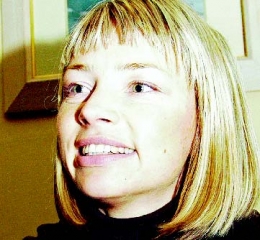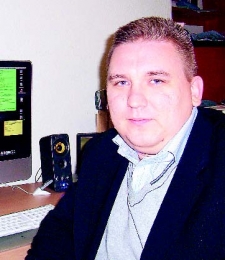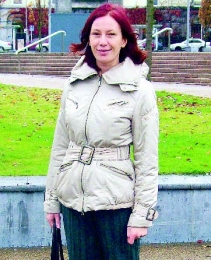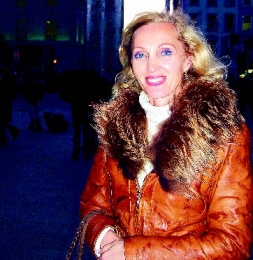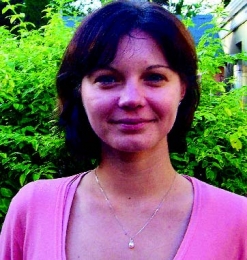Belarus and its 10 million residents stand at a European crossroads, sharing a border with Russia and Ukraine to their northeast and south, and neighbouring the EU countries of Poland, Lithuania and Latvia. But beyond Belarus’ global media tag as ‘Europe’s last dictatorship’, and its association with the 1986 Chernobyl disaster, little is often known about this intriguing yet somewhat isolated country, which boasts a wealth of traditions and has endured a turbulent history.In the first of a four-part series on Belarus, Ireland-based Belarusians speak to CATHERINE REILLY about their traditions, life in Ireland, and their controversial leader, Alexander Lukashenko.
IT WAS, remembers Tatiana Kovalenko, a fascinating time to be a school student.
Windows opened on the past, history books were revised and curricula experimented with. Amid the ruins of the Soviet Union, Belarus was re-crafting the boundaries of its new identity – and regaining some of its old one, too. Originally from the Belarusian capital Minsk, and living in Dublin since 2001, Tatiana recalls a new energy in the classroom following the restoration of independence in the early 1990s.
“Our teacher of history, I remember, was saying ‘I envy you that you live in such exciting times, the country is changing, there is so much going on.’ My generation grew up thinking that, from an early time, Belarus was actually independent and it played an important role in the world. And together with Lithuania, we formed a powerful state, the Great Duchy of Lithuania, and the border of this country extended from the Baltic Sea to the Black Sea.”
Before long, the history books took on a different emphasis. With the ascent of Alexander Lukashenko to the country’s presidency in 1994, a more Russified stance was adopted. “The books were re-written in a different way,” remembers Tatiana, “that always our country was developing together with our neighbours, the Russians and Ukrainians.”
The fall of the Soviet Union in 1991 had been a particularly difficult time for Belarus, one of the USSR’s 15 former republics, and perhaps one of its more willing constituents. The failure of communism hit hard, in both practical and emotional ways. People’s “system of values” were no more, explains Tatiana, and it was a “very difficult time” for them.
History judged the Soviet Union a failed exercise, but leaving aside its flawed, propagandist nature, there were many aspects of a Soviet-style society that were admirable. “I was a very happy child,” remembers Tatiana, of her 1980s upbringing. “And the thing I remember was that I was very proud to be living in the Soviet Union, when I was a child. I remember going to bed thinking ‘I am the happiest child in the world’ because I was born in the Soviet Union.”
As a young child, she was a member of Oktjabrjata, a Soviet Komsomol-type group which engaged in activities similar to the scouts. “We were learning some rules, how to behave, how to respect others and also to help the elderly. I remember we used to hang out around crossroads waiting for old grannies – babushkas – because we thought that now that we are members of this organisation for young people, we have to help, and we wanted to help them cross the roads,” laughs Tatiana, appreciating the funny side of this undoubtedly noble endeavour.
IN 1994, Alexander Lukashenko came to office. Since then, heavy criticism has come his way from the west – due to allegations of vote rigging and control of the media – with Condoleezza Rice memorably describing Belarus as an “outpost of tyranny”.
Tatiana, who is an interpreter and lecturer, suggests that Lukashenko has a quantity of admirers at odds with his damaged reputation in the west. “I do translations for Russian speaking people from Latvia and Lithuania – all of them say ‘we have a lot of respect for your president and he’s done a good job in keeping the economy and the country steady’...
Our president has been maintaining an average, decent level of living, so... I don’t know.” However, the powerful state media is very pro-government, she mentions.
As for life in Ireland, Tatiana reckons it’s a country that takes time to love and understand. There are some nuances to life here that require patience to negotiate; she comes from a society where people say what they think, whereas understanding the true meanings of the Irish can require complicated guesswork. While Belarusians in Ireland number only in the hundreds, Tatiana has encountered surprising connections with her motherland. For example, she came across Alexander Anisimov, a conductor with the National Symphonic Orchestra of Ireland who had been a conductor in Minsk for many years. “I was surprised to see him working in Dublin and decided to write about him for [the Russian language newspaper] Nasha Gazeta,” she says.
Tatiana’s parents have also visited her here, journeying to see the sights in Co Kerry. But unfortunately, their memories of Ireland are seen through a window pelted by rain showers. Tatiana reveals: “Now my mum, when I talk to her on the phone, she says: ‘Tanya, you have to go on holidays to some sunny country. Before, she wouldn’t say that to me, she’d say: ‘Don’t spend your money on holidays, watch your money!’”
PLAYING KAZAKI razbojniki (hide-and-seek) and building snowmen in the depths of the Belarusian winter, are among the “many happy memories” Lana Daineka holds of her childhood, spent in the small town of Oktyabrskij, near Gomel in southeast Belarus.
The mother-of-one, who lives in Galway, explains that Belarus’ natural amenities encouraged an active childhood. “Belarus is a very beautiful country,” she says, mentioning its vast forests. “People who live in the countryside like to go to the forest to gather mushrooms and berries - wild strawberries,blueberries, raspberries, cranberries. Men like fishing as there are so many lakes and rivers everywhere in Belarus.” Popular indoor activities include going to the theatre, opera and cinema, she adds. The Belarusian cuisine is full of different influences, she continues. “Modern Belarusian cookery is based on old national traditions. Since Belarusians maintained close economic and cultural ties with Russians, Ukrainians, Poles, Lithuanians, let’s say it’s predictable that the Belarusian cuisine influenced the cuisines of neighbouring people and vice versa.”
Common are dishes made from potato, which people call ‘the second bread’ - in Soviet times, Belarusians were sometimes called ‘potato eaters’, often with a derogatory connotation. Popular dishes include borshch (cabbage or beetroot soup cooked with meat) and draniki, best described as a pancake made from grated potato, sometimes with meat inside. A well-known type of soft drink is kvass, made from either brown bread or rye flour that has been malted.
THE CLOSENESS of Belarusian cuisine, and the people themselves, to the natural world makes the catastrophe of the 1986 Chernobyl disaster all the more poignant for Belarus. The accident at the Chernobyl nuclear plant in neighbouring Ukraine had – and continues to have – significant health, social and economic consequences for Belarus.
Being from the southeast of the country, Lana grew up in an area particularly affected by the disaster. She was nine years old when it happened. Lana remember her parents and relatives being “confused and frightened”, as news slowly began to surface about the catastrophe, which the Soviet government initially denied had occurred. The radioactive fallout affected over 20 per cent of the country, and as agricultural activities in affected areas were not immediately suspended, people ate food contaminated with radioactive iodine.
“Since iodine concentrates in the thyroid gland, this was a major cause of the high incidence of thyroid cancer in children,” says Lana, who believes that the full impact of the catastrophe is still unknown.
Lana went on to teach English literature and Belarusian – a language which has suffered a similar fate to Irish, and which usually plays second fiddle to Russian. In 2002, Lana decided to come to Ireland, where she worked as a shop assistant, earning more in this job than as a teacher in Belarus. She liked the country and decided to stay on. Lana now lives in Galway with her husband and son Sammy, and is studying Business Computing and Digital Media at the Galway- Mayo Institute of Technology. She points out that one key disparity between Ireland and Belarus is obvious in the countries’ respective health systems.
“In Belarus,” explains Lana, “the medical service is free for people. Any specialist-doctor such as surgeon, neurologist, eye-doctor, can be seen, if you make an appointment, the next day.” The political systems are also different, she adds, with more “privileges” for the leader in Belarus.
AS A NEWSPAPER editor, Konstantin Maskalenko is a man accustomed to turning the spotlight on others, rather than the other way around. The co-founder of Russian language newspaper Dublin Infocentre is much more comfortable talking about the newspaper and politics, rather than himself. He gives a brief runthrough of his origins – he was born in 1979 in the Vitebsk region – before speaking on life in Ireland, and attitudes to Belarus.
Before coming here on a work permit, he had lived in America. “I didn’t see my future in Belarus,” says Konstantin. “I couldn’t get the job there I wanted to.
“In America,” he continues, “when I said I was from Belarus, they didn’t know. But here, I don’t remember many Irish people who wouldn’t know the capital Minsk – ‘Oh yeah, Belarus, Minsk.’”
The subject of governance in Belarus is a complex one, and cannot accurately be reduced to sound bites, he suggests. “I probably don’t agree with the government, about what they do. They are not letting the opposition have freedom. I’m not in agreement with that. But at the same time, probably some people who live in Belarus they need this kind of government for them. If you give them freedom, probably there would be chaos. But it has to be changed.”
The state media gives its own biased slant on life, he says, but Konstantin does not believe that ‘dictatorship’ is the way to describe his country’s political system.
“The people who are living in Belarus, they are not afraid of the government. I think dictatorship is when the people are afraid of everything, afraid of their neighbours... They live quite freely for themselves. They are not getting too much money, their wages are very low, but they think they can do whatever they want,” says Konstantin, with a quick laugh. “It’s hard to say, you’d have to live there. People are quite happy about the situation.”
Konstantin enjoys his job at Ireland’s vast Russian-speaking population. Popular stories include those on immigration law, and on jobs and salaries. A particularly useful piece, recalls Konstantin, was one which explained the process by which an immigrant can become an Irish citizen.
SVIATLANA Punchanka definitely has a book in her. Between working in a secret Soviet military factory to experiencing, and surviving, the rampant exploitation which shames Ireland’s mushroom industry, the effervescent Belarusian woman’s stories would surely make fascinating, and challenging, reading.
A trained engineer in electronic communication from Orsha in northeast Belarus, Sviatlana came to Ireland over six years ago. Her job, arranged through an agency in Belarus, had cost some €2,500, and the work permit system in Ireland meant that she was effectively stuck with this employer. She arrived with little English. “When I came into Shannon [airport] the security asked me where I was going,” recalls Sviatlana, a youthful-looking woman in her forties. “I showed him the work permit because I didn’t know.”
Sviatlana was employed on a mushroom farm in Co Tipperary. Sometimes she worked up to 70 or 80 hours a week for just €200. It was literally back-breaking stuff, and today, she and her former coworkers from that farm all have reoccurring back problems. “Mushroom farm,” says Sviatlana with a shudder and a short laugh. “Not good job, but really a job is a job.” Eventually, she decided enough was enough and headed for Dublin. With assistance from the Migrant Rights Centre Ireland, the farm boss was challenged and compensation was forthcoming for Sviatlana and her co-workers. Now she is working as a cleaner in Dublin,
with better conditions, and has also done some casual work as a babysitter. She has been amazed that a married woman in Ireland can stay out until the early hours of the morning without her husband. In Belarus, she explains, couples go out together – although differing trends are emerging among the younger generations. “I was babysitting and I said to the husband ‘I’m so sorry, where’s your wife?’ He say ‘Gone to party.’ It’s possible in my country too, but she must come back at maybe 11 or 12.”
SVIATLANA’S background is not in babysitting, nor cleaning, but in telecommunications engineering. During the 1980s, she worked in the telephonic section at a military production factory in Minsk. “I think in every country you have these special factories, making things for the army. Sometimes the people don’t know what is being made in the factories…I was working there,” she says, laughing.
When she visits Belarus today, she sees improvements. “I hope Belarus will be better but it’s not too bad. I cannot tell that my country is all bad, that my president is all bad, it is not true really.” Her brother told her recently that in 10 to 15 years time, the country’s economy will be “number one”. However, Sviatlana believes that small businesses in Belarus need more favourable conditions, such as lower taxes. “My mummy, she’s very happy because she’s on the pension,” adds Sviatlana, mentioning that her mother would get around $250 a month. “She likes the president. My mummy is very happy with our president.”
IRYNA Khilkevich is a Belarusian woman who can speak meaningfully about Gaelic games – a rarity, indeed. When Metro Éireann points to the ‘Good Luck Lads’ posters dotted around the lively town of Celbridge, Iryna instantly informs me that the local football team are due to play in a replay of the county final which, in Gaelic football terms, is the gateway to local bragging rights. Iryna then mentions how, having watched some matches, she’s noticed that it is quickness of thought, and not the physical strength of a player, that determines
who can play at the highest level, and who can’t. It is quite an impressive range of commentary, and it comes as little surprise that Iryna’s Irish boyfriend, Mick
Wright, has a particular passion for Gaelic football – one that he is obviously attempting to pass on.
Originally from Bobruisk in Belarus’ Mogilev region, Iryna has been living in Ireland for seven years. Now an Irish citizen, she was previously working in a local shop as a sales assistant in Celbridge. The job allowed her to further improve her English, and indeed pick up some of the local accent, but it also had its frustrations. Iryna is a graduate of International Relations at the Belarusian State University, but could not move to another employment sphere due to the inflexibility of Ireland’s work permit system. She is now studying community interpreting at DCU.
Iryna has found the Irish people to be friendly, and notices some similarities between Belarusians and the Irish. “We understand each other’s sense of humour. They [the Irish] are so quick,” she says, shaking her head. “Belarusians tend to be ‘funny’ funny, while the Irish tend to be ‘sarcastic’ funny, probably because they can afford to be.” Asked for a characteristic trait of a Belarusian, “tolerance” is Iryna’s clear response. Belarusians and the Irish also share an enthusiasm about sporting matters. Sport in Belarus is quite varied – Iryna herself played volleyball – and is something that Lukashenko, an avid ice hockey fan, takes a personal interest in. Recently, someone informed her about the building of an ice hockey arena in her home city. “Who in Bobruisk plays ice hockey?” she was asked, rhetorically.
THERE IS A small Belarusian community of sorts in the Celbridge area, says Iryna, but they are beaten in numbers by Lithuanians, and particularly Poles. Citizens of EU countries can take life in Ireland for granted, she finds, and some are quick to complain about everything the country has to offer. Belarusians, she points out, struggle to get work permits in Ireland and are perhaps a bit more circumspect about criticising their adopted home.
As to perceptions of Belarus, Chernobyl is often mentioned, says Iryna. Her own family was unaffected by the catastrophe but people in other areas, including some in the Mogilev region, were not so lucky. “People were moved to Minsk, but many returned as they couldn’t bare to leave their homes behind.”
Last year, Iryna brought her Irish boyfriend to Belarus, where they visited Bobruisk, Minsk, and Grodno, in the northwest. From washing a disposable coffee cup to eating a preserved tomato without pealing it first, Mick was on a sharp learning curve during his trip, but found Belarus to be “very nice” and was also impressed by the road infrastructure. The roads, adds Iryna, are remnants of the Soviet era, when products were assembled in factories across the USSR, necessitating a high standard of infrastructure. “The roads are still good,” she says, “but only from that time.”
deputyeditor@metroeireann.com
